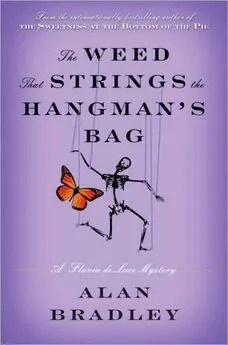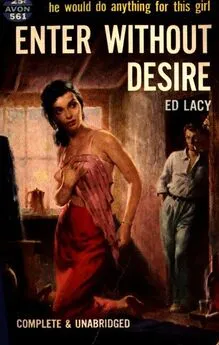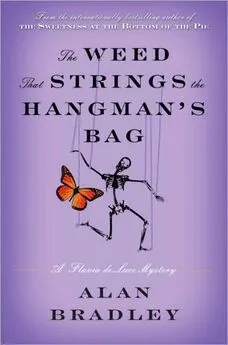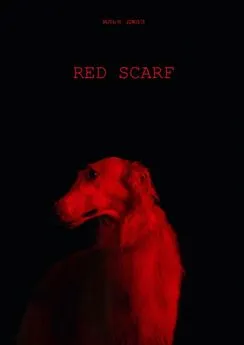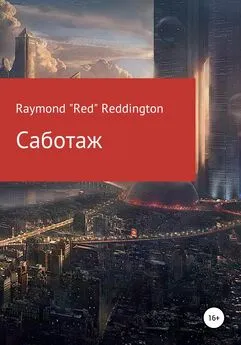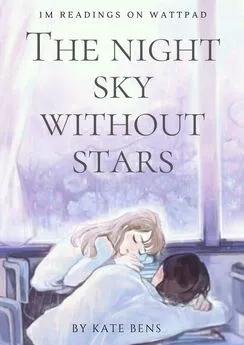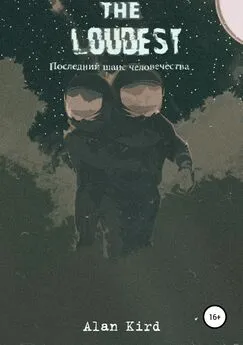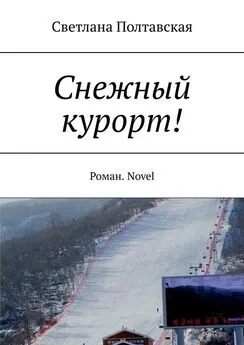Alan Bradley - A Red Herring Without Mustard: A Flavia de Luce Novel
- Название:A Red Herring Without Mustard: A Flavia de Luce Novel
- Автор:
- Жанр:
- Издательство:неизвестно
- Год:неизвестен
- ISBN:нет данных
- Рейтинг:
- Избранное:Добавить в избранное
-
Отзывы:
-
Ваша оценка:
Alan Bradley - A Red Herring Without Mustard: A Flavia de Luce Novel краткое содержание
A Red Herring Without Mustard: A Flavia de Luce Novel - читать онлайн бесплатно полную версию (весь текст целиком)
Интервал:
Закладка:
I had changed into a cleanish dress and left the dusty one soaking in one of the laboratory’s sinks. Later, I would hang it from one of the gas chandeliers to dry.
“You de Luces are a strange lot,” Porcelain said.
“Ha! Less than an hour ago you thought that at least two of us were ladylike young women.”
“That was before you showed me the cellars.”
I noted that our little tour of the Chamber of Horrors had changed her mind.
“Speaking of cellars,” I told her, “I’m not easily frightened, but I didn’t much care for that stuff about the lady who owned the sedan chair.”
“It wasn’t stuff. I was telling you what I saw.”
“Saw? You’re asking me to believe that you saw a woman in a powdered wig and a silk dress?”
For someone with a scientific mind, like me, this was hard to swallow. I had still not decided what to make of Brookie Harewood’s Gray Lady of Buckshaw, or Fenella’s cold woman who wanted to come home from the mountain. To say nothing of the pixies. Did everyone take me for a gullible fool, or were there really other worlds just beyond our range of vision?
“In a way, yes,” Porcelain said. “I saw her with my mind.”
This I could understand—at least a little. I could see things with my own mind: the way, for instance, that trimethylamine could be produced by allowing Bacillus prodigiosus to grow on a sample of Mrs. Mullet’s mashed potatoes in the heat of a summer afternoon. The resulting blood-red specks—which were known in the Middle Ages as “Wunderblut,” or “strange blood,” and which for a whole week in 1819 had appeared on various foods at Padua—would release not only the smell of ammonia, but also the unmistakeable odor of trimethylamine.
When you come right down to it, I suppose, there is no great difference between ghosts and the invisible worlds of chemistry.
I was glad I had remembered dear old trimethylamine: my chemical friend with the fishy smell. I had discussed it with Dogger several days ago and formed certain opinions which I had been prevented from acting upon.
It was time now to pick up the threads and follow them, wherever they might lead.
“I’m tired,” I told Porcelain, yawning vastly.
Five minutes later we were tucked up in bed, one of us drifting rapidly towards oblivion.
I waited until she was asleep, then slipped quietly out of bed.
It was just past midnight when I eased shut my bedroom door and crept silently down the curving staircase.
I remembered that Dogger kept a high-powered torch in the butler’s pantry for what he called “midnight emergencies,” and it took only a moment to find it.
No frail candle this time , I thought: I had at my fingertips sufficient power to light up the Palace Pier at Brighton. I hoped it would be enough.
The cellars seemed colder than I had remembered. I should have worn a sweater, but it was too late now.
I was quickly at the point where the electric bulbs ended: beyond them, a cavernous blackness that led—who knew where?
I switched on the torch and pointed it along the passageway. Far ahead, I could see the outline of the sedan chair. I no longer relished the thought of climbing into the thing and recalling days gone by; in fact, I would be relieved to get past it.
“There is no lady,” I said aloud, and to my relief, there wasn’t.
Ahead, the passage took a slight shift to the right. Since I had essentially set off to the right from the bottom of the kitchen stairs, I was heading east—now a little southeast, towards the Visto and the Poseidon fountain.
The gum-boot footprints were easy to follow now, no longer overprinted with Porcelain’s and mine. There were several sets, I noted, three coming and two going. If, as I suspected, they were Brookie’s, he had made his first trip to steal one of the firedogs, his second to return it and make off with the second. On his last visit he had left by way of the French doors.
A sudden cold draft swept past me. Good job I’d brought the torch—the candle would certainly have blown out.
With the draft came a dark and a dank odor: an odor I could not at once identify, but one which suggested the reservoirs of neglected water closets: green corrosion with more than a whiff of zinc.
Well , I thought, I’m not afraid of zinc, and green corrosion is something that has always interested me .
I pushed on.
When I had been down here earlier with Porcelain, I had heard a definite metallic clank , but now the passage—which had begun to narrow—was as silent as the tomb.
In front of me was an archway with an open door, beyond which, or so it seemed, was a room.
I took two careful steps down into the chamber and found myself surrounded on all sides with metal pipes: zinc pipes, lead pipes, iron pipes, bronze pipes, copper pipes; pipes running up, down, and across, all interconnected with right elbows and great metal bolts with here and there a huge valve like the steering wheel of a motorcar.
I was at the very heart of Lucius de Luce’s subterranean waterworks!
And then I heard it—a metallic clanking that echoed round and round the chamber.
I’ll admit it—I froze.
Another clank .
“Hello,” I called, my voice shaking. “Is anyone there?”
From somewhere came another sound: an animal sound for certain, though whether it was human, I could not tell.
What if a fox had made its way into the tunnel? Or a badger?
If that was the case, it would likely run away from a human with a torch—but what if it didn’t?
“Hello?” I called again. “Is anyone there?”
Again a muffled sound, weaker. Was it farther away, or was I imagining things? One thing was certain: It could only be coming from somewhere behind a giant pipe that rose up out of the stonework, leveled off, bent ninety degrees, and headed off towards the far side of the chamber.
I scrambled up onto the thing, straddled it for a moment—then dropped down on the other side.
The passageway into which the pipe led was lower, narrower, and damp. Moisture beaded on the walls, and the floor, between bricks, was wet earth.
Just ahead, the tunnel was blocked by an iron gate: an iron gate that was chained shut and locked on the other side with a large, old-fashioned padlock.
I gave the thing a rattle, but it was absolutely solid. Without a key, there wasn’t a hope of getting past.
“Damn!” I said. “Damn and double damn!”
“Flavia?” someone croaked.
I must admit that I came very close to disgracing myself.
I shone the beam through the bars and picked out a shape huddled on the ground.
For as long as I live I shall never forget his white face staring up at me, blinded by the torch’s beam. He had managed, somehow, to lose his spectacles, and his pale eyes, blind and blinking, were those of a baby mole pulled from its hole and dragged out suddenly into the daylight.
“Colin?” I said. “Colin Prout?”
“Turn it off!” he pleaded in a ragged voice, twisting away from the light.
I swung the torch away, so that the passage beyond the bars was once more in near-darkness.
“Help me,” Colin said, his voice pitiful.
“I can’t. The gate is locked.”
I gave the massive thing a shake with one hand, hoping it would spring open—perhaps by some as-yet-undiscovered magic—but that did not happen.
“Try it from your side,” I told him. “There might be a latch …”
I knew, even as I said it, that there wasn’t, but anything was worth a try.
“Can’t,” Colin said, and even in the darkness I could tell that he was on the verge of tears. “I’m tied up.”
“Tied up?” It seemed impossible, even though I had once or twice been in the same position myself.
“I’ve got the key, though. It’s in me pocket.”
Praise be ! I thought. Finally, a bit of luck .
“Wiggle yourself over to the gate,” I said. “I’ll try to reach the key.”
There was a painful silence, and then he said, “I’m … I’m tied to somethin’.”
And he began to whimper.
It was enough to make a saint spit!
But wait: The padlock was on Colin’s side of the gate, wasn’t it? I had noticed this but not given it my proper attention.
“Did you lock yourself in?” I asked.
“No,” Colin snuffled.
“Then how did you get in there?”
“We come through the door in the fountain.”
A door in the fountain ? We ?
I chose to ask the most important question first.
“Who’s ‘we,’ Colin? Who did this to you?”
I could hear him breathing heavily in the darkness, but he did not answer.
I realized at once the futility of it all. I was not about to spend the rest of my life trying to pry answers out of a captive from whom I was separated by a wall of iron bars.
“All right, then,” I said. “It doesn’t matter. Tell me about the door in the fountain. I’ll come round and let you out.”
It made me furious, actually, to think that I should have to ask a stranger about a secret door at Buckshaw—and secret it must be, for I had never heard of such a thing myself. Such mysteries were surely meant to be handed down by word of mouth from one family member to another, not practically pried from a near-stranger who skulked about the countryside in the company of a poacher.
“Simon’s toe,” Colin said.
“What? You’re not making any sense.”
The sound of sobbing told me there was no more to be got from him.
“Stay here,” I said, although it made no sense. “I’ll be back before you know it.”
“No, wait!” he cried. “Give me the torch. Don’t leave me alone!”
“I have to, Colin. I need the torch to light my way.”
“No, please! I’m ’fraid of the dark!”
“Tell you what,” I said. “Close your eyes and count to five hundred and fifty. It won’t be dark with your eyes closed. When you finish, I’ll be back. Here—I’ll help you start. One … two … three …”
“Can’t,” Colin interrupted, “I ’aven’t learnt my hundreds.”
“All right, then, let’s sing. Come on, we’ll sing together:
“ God save our gracious King ,
Long live our noble King ,
Long may he …
“Come on, Colin, you’re not singing.”
“Don’t know the words.”
“All right, then, sing something you know. Singing will make me come back sooner.”
There was a long pause, and then he began in a cracked and quavering voice:
“ London Bridge is … fallin’ down
Fallin’… down, fallin’ down
London Bridge is fallin’ down … ”
I turned round and began to pick my way carefully back along the passage, the sound of Colin’s voice soon becoming no more than a faint echo. Leaving him there, alone in the darkness, was one of the most difficult things I’ve ever had to do, although I can’t say why. Life is full of surprises like that.
The return journey seemed endless. Time had surely slowed as I made my way back beneath the low arched ceilings to the cellars.
Up the steps I went and into the kitchen. Although the house was in perfect silence, I paused anyway to listen at the door.
Nothing.
Technically, I knew, I was not being disobedient. I had been forbidden to leave home, and I had no intention of doing so. The Poseidon fountain was well within the bounds of Buckshaw, which allowed me to have my cake and jolly well eat it, too.
I slipped quietly out the back door, leaving it unlocked, and into the kitchen garden. Overhead, the stars twinkled like a million mad eyes, while the moon, already halfway to its first quarter, hung like a broken silver fingernail in the night sky.
Читать дальшеИнтервал:
Закладка:

